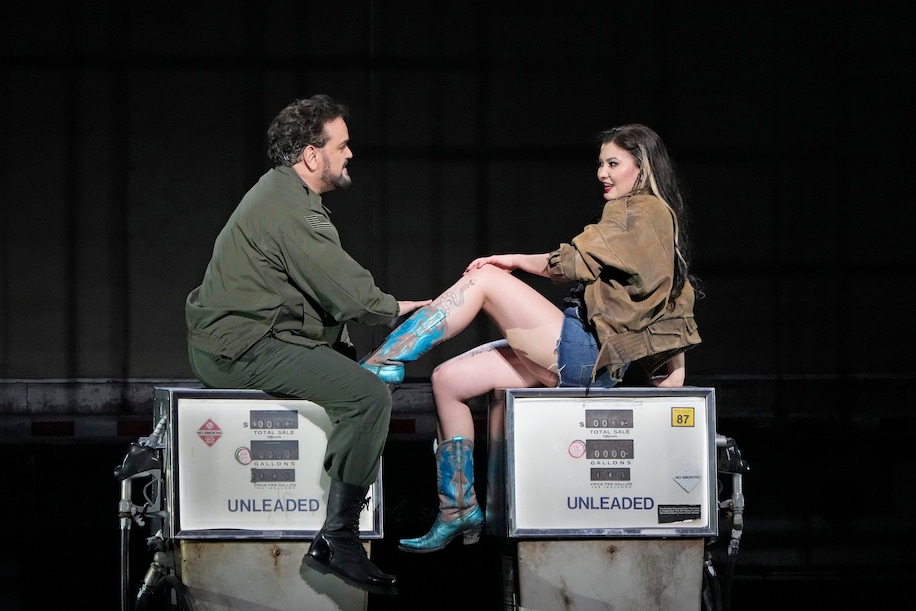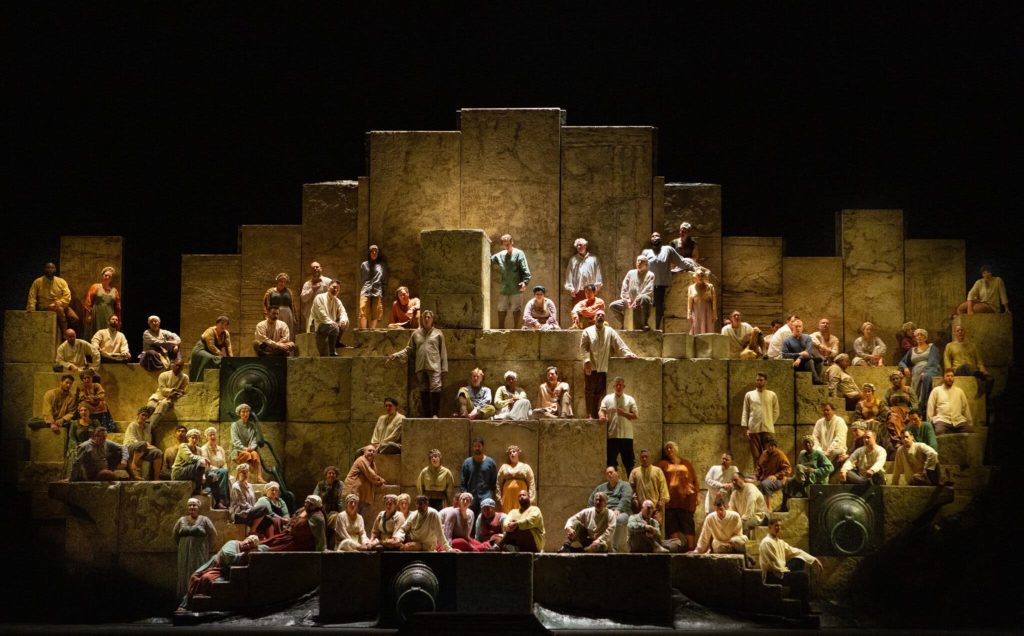VIEWPOINTS – Contrasting nights at the Met: A new, revisionist staging of CARMEN and a sturdily traditional revival of NABUCCO
- By drediman
- January 4, 2024
- No Comments
On consecutive evenings this week, I had the opportunity to take in back-to-back viewings of contrasting productions at the Metropolitan Opera. As per usual, read on for my thoughts.

CARMEN
The Metropolitan Opera
In repertory through May 25
This New Year’s Eve, the Metropolitan Opera premiered its new production of Bizet’s Carmen(RECOMMENDED) directed by British theater director Carrie Cracknell. Although I wouldn’t go far as to agree that the staging is a complete feminist overhaul of the opera — which the Met touts it is — the visually spotty production nonetheless provides illuminating contemporary context to the beloved opera’s narrative. Updated to present-day America (presumably along the Mexican border), it makes the case that Carmen’s tragedy is a societal tragedy propelled by prevailing socio-economic and gender norms. Accordingly, in the coveted title role, the young Russian soprano Aigul Akhmetshina, in a coolly confident turn, makes for a strikingly sympathetic, almost even-keeled seductress and not quite the smoldering femme fatale that we’re used to — indeed, more a spirited everywoman than a singularly untamable creature. Vocally, she gave a controlled, clarion performance that seemed to channel the dramatic intent of her interpretation. Valiantly filling in for an ailing Piotr Beczata, sturdy tenor Rafael Davila’s portrayal of Don José was serviceable but seemed, understandably, still a work in progress. The production’s first cast also included popular soprano Angel Blue as a full-voiced Micaela, as well as stylish bass-baritone Kyle Ketelsen as a subtly menacing Escamillo. Although Daniele Rustioni led the mighty Met Orchestra in a balanced, perfectly respectable reading of the score, a bit more fire wouldn’t have hurt. As always, the Met Chorus was in excellent shape throughout.

NABUCCO
The Metropolitan Opera
In repertory through January 26
Playing in repertory with the contemporary new take on Carmen is the Met’s sturdily old fashioned production of Verdi’s Nabucco (RECOMMENDED). Although it premiered just a tad more than two decades ago in 2001, Elijah Moshinsky’s staging comes across as older than it actually is, adhering strictly to the aesthetic of the Met of old (e.g., detailed and imposing physical sets, a literal interpretation, stiff blocking, etc.). This isn’t necessarily a bad thing — more often than not, there’s a certain element of “grand opera” that’s missing from many of the Gelb-era productions, most of which are staged by trendy theater directors with little concern for spectacle for spectacle’s sake. As such, it’s refreshing to come across relics like the Met’s Nabucco, which features a massive rotating set — whose monumental multi-level depictions of Jerusalem and Babylon exude irresistible historical sweep — that takes full advantage of the opera house’s massive stage. Musically, the current revival is very good, particularly the Met Chorus, who shined brightly in the opera’s parade of insistently melodic choral numbers (the work’s moving ode to human resilience, “Va, pensiero”, was especially radiant). In terms of the principal cast, veteran baritone George Gagnidze led the way, making a notable Met debut as the Babylonian king Nabucco in a vocally secure, dramatically informed performance. Returning as his fiery daughter Abigaille was soprano Liudmyla Monastyrska, who sang the role with thrilling abandon. As star crossed lovers, mezzo-soprano Maria Barakova and tenor SeokJong Baek were ideally suited to each other — his forceful ardor melding beautifully with her poised singing. Last but not least, conductor Daniele Callegari conducted a robust, well-rounded rendition of Verdi’s early masterpiece.

 Copyright © 2024
Copyright © 2024
Leave a Reply